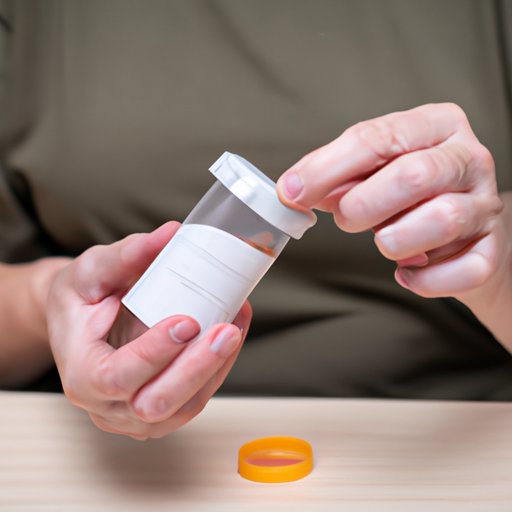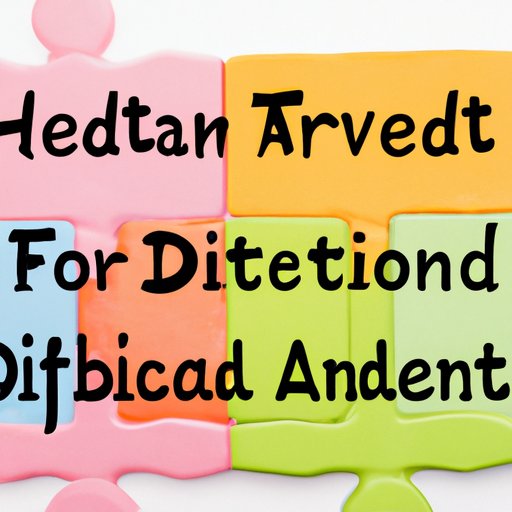
A Comprehensive Guide to ADHD Treatment: Finding the Most Effective Options
Attention-deficit/hyperactivity disorder (ADHD) is a neurodevelopmental disorder that affects millions of people worldwide. The impact of ADHD on an individual’s daily life can be significant, with symptoms such as inattention, hyperactivity, and impulsivity often leading to difficulty with organization and time management, poor performance at work/school, and relationship problems.
Effective treatment can help manage the symptoms of ADHD, enabling individuals to live a more fulfilling life. However, with several treatment options available, navigating the choices and making the right decision can be challenging. In this article, we will provide a comprehensive guide to ADHD treatment, including detailed discussions of medication, therapy, and lifestyle changes. We will also evaluate the pros and cons of different treatment options, provide tips on choosing the most effective treatment, and explore alternative approaches, including recent advances in ADHD treatment options.
A Comprehensive Guide to ADHD Treatment: A Closer Look at the Most Effective Options
Effective ADHD treatment can involve medication, therapy, and lifestyle changes. Each of these approaches works in different ways to manage the symptoms of ADHD.
Medication
Medication is one of the most common treatments for ADHD and involves the use of drugs that can help manage the symptoms of the disorder. Stimulants like Ritalin and Adderall, and non-stimulants like Atomoxetine (Strattera), are the two primary categories of medication used to treat ADHD. Stimulants work by boosting the levels of dopamine and norepinephrine in the brain; however, non-stimulants work differently by selectively inhibiting the norepinephrine transporter, thereby increasing the availability of norepinephrine in the brain.
Stimulants have been used to treat ADHD for over 60 years and are known to be very effective in managing symptoms such as hyperactivity, impulsivity, and inattention. Non-stimulants, on the other hand, are known to have fewer side effects than stimulants, but they may take up to six weeks to start working.
Therapy
Therapy can also be beneficial for individuals with ADHD. Behavioral therapy, for example, involves teaching individuals how to manage their symptoms effectively through the use of positive reinforcement, feedback, and goal setting. Other types of therapy, such as cognitive-behavioral therapy (CBT), may also be useful in managing ADHD symptoms.
Therapy can help individuals develop strategies for managing their symptoms by increasing their understanding of the disorder and developing coping mechanisms for situations where ADHD symptoms may arise.
Lifestyle Changes
Lifestyle changes can also be very effective in managing ADHD symptoms. Exercise, good nutrition, and sleep hygiene are some of the recommended lifestyle changes that can help individuals with ADHD manage their symptoms more effectively. Exercise, in particular, has been shown to help regulate dopamine levels, which can improve focus and attention.
Individuals with ADHD may also benefit from developing organizational strategies, such as breaking tasks into smaller, more manageable parts and creating schedules to help structure the day and manage time.
ADHD Treatment Options: Evaluating the Pros and Cons
Each treatment option for ADHD has its pros and cons. It is important to understand these when choosing the most effective treatment for an individual with ADHD. Stimulant medication, for example, has known potential benefits, such as being highly effective in managing symptoms such as hyperactivity and impulsivity. These drugs are also generally well-tolerated by most individuals, although side effects can include appetite suppression, sleep disturbances, and irritability.
In contrast, non-stimulant medication may have fewer side effects, but they may take longer to work and may not be suitable for individuals with certain medical conditions, such as liver disease.
Therapy, while less studied than medication, can be beneficial in teaching individuals how to manage their ADHD symptoms better. For example, behavioral therapy can improve social and organizational skills, while CBT can help individuals change thought patterns and improve their sense of self-awareness. However, therapy is often more time-consuming and can be more challenging to access than medication.
Finally, lifestyle changes like exercise, good nutrition, and sleep hygiene can be effective in managing ADHD symptoms but may require a significant commitment to achieve measurable improvements in ADHD symptoms. For example, regular exercise may improve attention, but a consistent exercise routine may require motivation and time management skills to maintain.

Finding the Right Fit: How to Choose the Most Effective ADHD Treatment
Choosing the most effective ADHD treatment often involves working with healthcare providers and evaluating the individual’s symptoms, medical history, and personal preferences. Factors such as age, the severity of symptoms, and lifestyle can influence the decision-making process.
When working with a healthcare provider to choose a treatment, it is essential to communicate openly about any concerns or doubts about the options available. The healthcare provider can help select the most appropriate medication or therapy and provide recommendations for lifestyle modifications that may be beneficial in managing symptoms.
Another key to finding the appropriate treatment is to monitor progress and make changes as necessary. Over time, individuals with ADHD may find that their treatment needs change, requiring adjustments to dosage and medication or switching to an alternative therapy.
New Advances in ADHD Treatment: What You Need to Know
Recent advances in pharmacological and non-pharmacological ADHD treatment options are giving patients with ADHD new hope regarding effectively treating their symptoms.
Pharmacology
The first significant development in ADHD treatment has been the introduction of long-acting non-stimulant medications like Guanfacine and Clonidine. These drugs work by boosting norepinephrine levels and have been shown to be as effective as stimulant medication while providing a new option for those who are unable to tolerate stimulant medication.
Another new FDA-approved medication is called Vyvanse. This medication’s benefits stretch beyond providing relief to ADHD symptoms for up to fourteen hours; it comes with the additional benefits of being non-addictive and safe to use.
Non-pharmacology
Among the current non-pharmacological opportunities to treat ADHD are lifestyle modifications such as diet and behavioral interventions. Preventing nutrient deficiency by supplementing nutrient intake or eliminating trigger food allergies will eliminate many ADHD symptoms.
Beyond Medication: Alternative Approaches to Treating ADHD
Alternative methods of ADHD treatment are becoming increasingly popular as evidence grows for their effectiveness in managing symptoms in combination with conventional treatments or as standalone treatments, non-medication approaches like dietary changes and behavioral interventions can be used in conjunction with medication and therapy.
Dietary Changes
Some studies suggest that eliminating certain types of food, such as foods high in refined sugar, artificial additives, or preservatives, can help manage ADHD symptoms better. Research has also shown that following a low-glycemic index (GI) diet, which includes healthy carbohydrates, proteins, and fats, can improve cognitive performance and reduce ADHD symptoms.
Behavioral Interventions
ADHD coaching, a specialized type of behavioral intervention, is becoming more prevalent as research has shown positive effects. It focuses on behavior modification through training, techniques, and tools that allow individuals with ADHD to succeed in life and feel more in control of their lives. Thus, ADHD coaching can help patients to establish meaningful goals, create strategies to overcome challenges and stay focused on them until they achieve them.
Navigating ADHD Treatment: Expert Insights on What Works Best
ADHD treatment can be complex and challenging, but working with professionals trained in the disorder’s management is the optimal way of providing quality care and help.
Dr. Jeremy Pettus, a board-certified specialist in ADHD, emphasizes that a combination of medication and therapy proves most effective in managing symptoms.
Dr. Pettus explains that medication can help individuals manage their ADHD symptoms, and behavioral therapy can help develop skills and habits to manage ADHD more adaptively in their day-to-day lives.
Additionally, experts encourage individuals to make lifestyle changes along with their medical treatment to manage their ADHD’s symptoms more effectively.
Conclusion
ADHD is a neurodevelopmental disorder that can affect daily life. Effective treatment involves medication, therapy, and lifestyle changes. Medication and therapy can be effective in managing symptoms, while lifestyle changes like healthy eating habits, exercise, and organized strategies provide benefits.
Individuals should consult healthcare providers when choosing treatment options, monitor their progress, and adjust as needed in the future. New treatments such as long-acting non-stimulant and Vyvanse have been approved to treat ADHD.
Dietary changes and behavioral interventions are alternative therapies that have also been found to be effective in treating ADHD. ADHD coaching can be a specialized form of behavioral intervention and is rising in popularity as an efficient way of training individuals to manage their symptoms.
Lastly, a combination of medication, therapy, and lifestyle changes coupled with regular follow-up consultations with healthcare providers operating in the ADHD management field is the most practical approach to achieve the best treatment outcomes.




